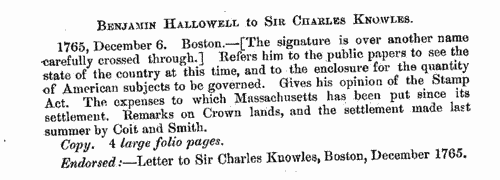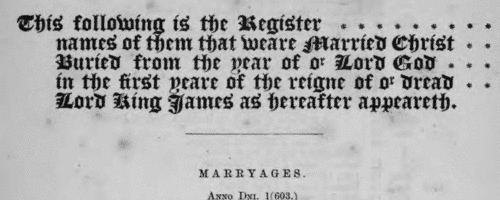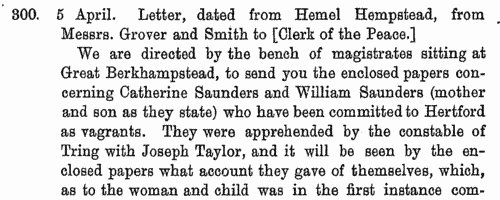Whit Surname Ancestry ResultsOur indexes 1000-1999 include entries for the spelling 'whit'. In the period you have requested, we have the following 28 records (displaying 21 to 28): Single Surname Subscription | | | Buying all 28 results of this search individually would cost £138.00. But you can have free access to all 28 records for a year, to view, to save and print, for £100. Save £38.00. More... |
These sample scans are from the original record. You will get scans of the full pages or articles where the surname you searched for has been found. Your web browser may prevent the sample windows from opening; in this case please change your browser settings to allow pop-up windows from this site.  Apprentices registered at Edinburgh
(1715-1717) Apprentices registered at Edinburgh
(1715-1717)
Apprenticeship indentures and clerks' articles were subject to a 6d or 12d per pound stamp duty: the registers of the payments usually give the master's trade, address, and occupation, and the apprentice's father's name and address, as well as details of the date and length of the apprenticeship. There are central registers for collections of the stamp duty in London, as well as returns from collectors in the provinces. There was a single collection for the whole of Scotland, made in Edinburgh. The sums collected are recorded in Scottish money, with conversion to sterling for transfer to London. A Scottish pund was worth 20 English pence. Because of the delay before some collectors made their returns, this register includes indentures and articles from as early as 1714. (The sample entry shown on this scan is taken from a Norfolk return)WHIT. Cost: £8.00.  | Sample scan, click to enlarge

|  Masters of Apprentices registered at Edinburgh
(1720-1723) Masters of Apprentices registered at Edinburgh
(1720-1723)
Apprenticeship indentures and clerks' articles were subject to a 6d or 12d per pound stamp duty: the registers of the payments usually give the master's trade, address, and occupation, and the apprentice's father's name and address, as well as details of the date and length of the apprenticeship. There are central registers for collections of the stamp duty in London, as well as returns from collectors in the provinces. There was a single collection for the whole of Scotland, made in Edinburgh. The sums collected are recorded in Scottish money, with conversion to sterling for transfer to London. A Scottish pund was worth 20 English pence. Because of the delay before some collectors made their returns, this register includes indentures and articles from as early as 1719. (The sample entry shown on this scan is taken from a Norfolk return)WHIT. Cost: £8.00.  | Sample scan, click to enlarge

| Nottinghamshire Marriage Licences
(1701-1753)
Nottingham Archdeaconry, which was almost coextensive with the county of Nottingham, lay in the diocese and province of York, but it had substantially independent jurisdiction for both probate and the issuing of marriage licences. These are abstracts of the archdeaconry marriage licences: they usually state the groom's address, occupation, age, and condition; the bride's address, age and condition; and the names of the churches or parishes at which it was intended the marriage would be celebrated. Not all licences led to marriages. Where the age given is 21, it should be construed as '21 or over'. There was no obligation for the marriage to take place at the parish suggested, but the licence would only be valid within the county. These abstracts have been annotated with extra information found on the marriage bonds. 26 Nottinghamshire parishes (Beckingham, Darlton, Dunham, Eaton, North Leverton, Ragnall, Rampton, South Wheatley, Cropwell Bishop, Bleasby, Blidworth, Calverton, Caunton, Edingley, Farnsfield, Halloughton, Holme, Kirklington, Morton, North Muskham, Norwell, Oxton, South Muskham, Southwell, Upton and Woodborough) lay within the small peculiar jurisdiction of Southwell, which issued its own licences: abstracts of these for the period 1755 to 1833 are also included here.WHIT. Cost: £4.00.  | Sample scan, click to enlarge

|  Apprentices registered at Evesham
(1765) Apprentices registered at Evesham
(1765)
Apprenticeship indentures and clerks' articles were subject to a 6d or 12d per pound stamp duty: the registers of the payments usually give the master's trade, address, and occupation, and the apprentice's name, as well as details of the date and length of the apprenticeship. There are central registers for collections of the stamp duty in London, as well as returns from collectors in the provinces. These collectors generally received duty just from their own county, but sometimes from further afield. The indentures themselves can date from a year or two earlier than this return. (The sample entry shown on this scan is taken from a Durham return. Each entry has two scans, the other being the facing page with the details of the indenture, length of service, and payment of duty.) IR 1/55WHIT. Cost: £8.00.  | Sample scan, click to enlarge

| British administration in North America
(1755-1776)
The papers of the 2nd Earl of Dartmouth, who served as Secretary of State for the American Department, contain correspondence relating to North America and the West Indies. They include some material earlier than 1755.WHIT. Cost: £4.00.  | Sample scan, click to enlarge

| Wandsworth Burials
(1787)
The ancient parish of Wandsworth in Surrey comprised the single township of Wandsworth, including the hamlets of Garratt, Half Farthing and Summers Town. It lay in the archdeaconry of Surrey of the diocese of Winchester: unfortunately, few bishop's transcripts of Surrey parish registers survive earlier than 1800. Although the original parish registers of Wandsworth doubtless commenced in 1538, the volume(s) before 1603 had been lost by the 19th century. In 1889 a careful transcript by John Traviss Squire of the first three surviving registers was printed, and we have now indexed it year by year. From 1760 onwards the burial registers contain date of burial, and full name; for the burial of children, the parents' names are only occasionally stated, just the word 'inf.' for infant; for the burial of wives, the husband's name; ages are given for adults. Extra details such as date or cause of death, address or occupation are almost never given. The burial registers are considerably more bulky than the baptism registers, because the burying ground was used by Dissenters, who formed a large part of the population. These include a French Protestant congregation that worshipped in a church (the registers of which do not survive) in a courtyard immediately opposite the parish church. The Quakers had a cemetery of their own. 'P.' or 'Paup.' indicates the burial of a pauper.WHIT. Cost: £4.00.  | Sample scan, click to enlarge

| Hertfordshire Sessions
(1699-1850)
Incidents from the Hertfordshire Sessions Rolls. These cover a wide range of criminal and civil business for the county, with presentments, petitions, and recognizances to appear as witnesses: many of the records concern the county authorities dealing with regulation of alehouses, religious conventicles, absence from church, highways, poaching, profanation of the Sabbath, exercising trades without due apprenticeship &c. Unlike the Sessions Books, the decisions of the justices are not recorded on the rolls, which serve more as a record of evidence and allegations. This is a calendar of abstracts of extracts: it is by no means a completely comprehensive record of the surviving Hertfordshire sessions rolls of the period, but coverage is good. WHIT. Cost: £4.00.  | Sample scan, click to enlarge

| Unclaimed Naval Prize Money
(1855-1902)
Various prize moneys were awarded to officers and men who served on board her Majesty's ships. For one reason or another a substantial number of these prizes, from as little as a shilling or two to as much as many pounds, remained undistributed by 1902, when this comprehensive list of the unclaimed moneys was printed: it lists unclaimed shares of prize money, slave and pirate bounties, salvage awards, parliamentary grants, gratuities and other moneys distributed by the Admiralty 1855 to 1902, but which omits moneys for service on the China Station during the war of 1856 to 1880, and special gratuities for service in Egypt (1882), Soudan (1884) and Soudan and Nile Expedition (1884-1885), for which there are separate indexes. In each case the sailor's name is given first (surname, then christian name or initials); rank or rating; ship in which serving at time of capture or award; and the amount due.WHIT. Cost: £6.00.  | Sample scan, click to enlarge

|
Research your ancestry, family history, genealogy and one-name study by direct access to original records and archives indexed by surname.
|











